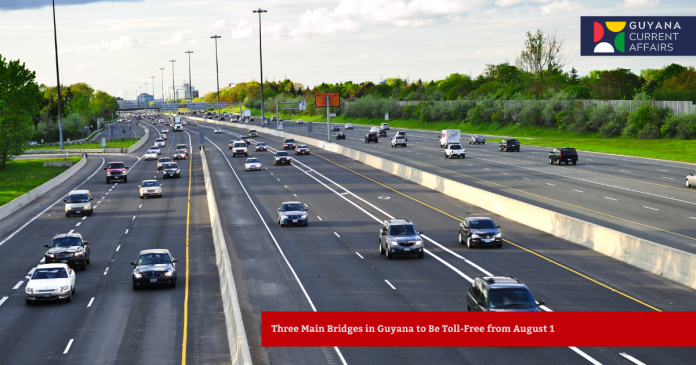In a significant move to enhance connectivity and reduce the cost of living for Guyanese citizens, President Irfaan Ali has announced that the Demerara Harbour Bridge, the Berbice River Bridge, and the Wismar Bridge will be toll-free starting August 1, 2025. This decision was made public during a gathering at Babu Jaan, Port Mourant, where the President celebrated the legacy of Dr. Cheddi Jagan.
Key Aspects of the Decision
- Financial Relief: The removal of tolls is expected to provide substantial financial relief to commuters. Currently, the tolls range from G$40 for motorcycles to G$1,900 for cars crossing the Berbice River Bridge. This change will save over 50,000 daily commuters an estimated G$3.5 billion annually, making transportation more affordable for families and businesses.
- Economic Benefits: By eliminating tolls, the government aims to boost local economies through reduced transportation costs, encouraging more travel and trade between regions. This move is part of broader efforts to enhance regional connectivity and stimulate economic growth.
- Infrastructure Development: The initiative aligns with Guyana’s infrastructure development plans, which include the construction of a new Demerara River Bridge. The existing bridges will remain toll-free even after the new bridge is completed, ensuring continued ease of travel for citizens.
Community Reaction
- Public Support: The announcement was met with enthusiasm, reflecting the public’s appreciation for measures that ease financial burdens and improve accessibility. Citizens view this move as a significant investment in their quality of life and economic opportunities.
- Economic Impact: The abolition of tolls is expected to enhance the nation’s connectivity, facilitating the free flow of people and goods. This will likely stimulate trade and commerce, contributing to Guyana’s economic development and social equity.
Broader Implications
- Sustainability and Funding: While the decision provides immediate economic relief, there are concerns about long-term sustainability. The government must balance the benefits of toll-free bridges with the need for sustainable infrastructure funding, potentially exploring alternative revenue streams.
- Future Development: This initiative sets a precedent for future infrastructure projects, emphasizing the importance of accessible and affordable transportation in driving economic growth and social progress. As Guyana continues to develop its infrastructure, similar policies may be implemented to ensure equitable access to public services.


